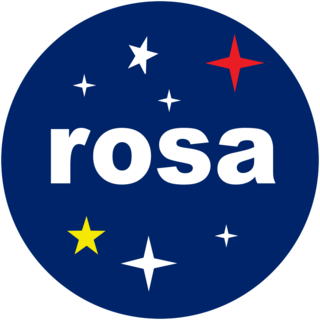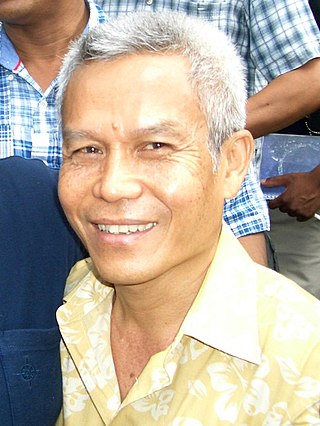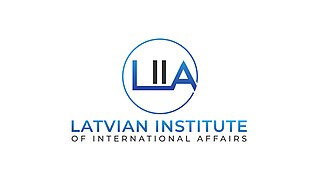
The Naukowa i Akademicka Sieć Komputerowa, abbreviated NASK, is a Polish research and development organisation, data networks operator, and internet domain name registry operator for the .pl country-level top-level domain.

Youth empowerment is a process where children and young people are encouraged to take charge of their lives. They do this by addressing their situation and then take action in order to improve their access to resources and transform their consciousness through their beliefs, values, and attitudes. Youth empowerment aims to improve quality of life. Youth empowerment is achieved through participation in youth empowerment programs. However scholars argue that children's rights implementation should go beyond learning about formal rights and procedures to give birth to a concrete experience of rights. There are numerous models that youth empowerment programs use that help youth achieve empowerment. A variety of youth empowerment initiatives are underway around the world. These programs can be through non-profit organizations, government organizations, schools or private organizations.
Sexual grooming is the action or behavior used to establish an emotional connection with a minor under the age of consent, and sometimes the child's family, to lower the child's inhibitions with the objective of sexual abuse. It can occur in various settings, including online, in person, and through other means of communication. Children who are groomed may experience mental health issues, including "anxiety, depression, post-traumatic stress, and suicidal thoughts."

UNITED for Intercultural Action is a European network against nationalism, racism, fascism and in support of migrants and refugees, in which over 560 organisations from 48 European countries cooperate. UNITED was founded in 1992 and provides a forum for active solidarity and cooperation between a wide variety of organisations in Europe and their activists across European borders.
Human rights education (HRE) is the learning process that seeks to build up knowledge, values, and proficiency in the rights that each person is entitled to. This education teaches students to examine their own experiences from a point of view that enables them to integrate these concepts into their values, decision-making, and daily situations. According to Amnesty International, HRE is a way to empower people, training them so their skills and behaviors will promote dignity and equality within their communities, societies, and throughout the world.

The Romanian Space Agency is a public institution that coordinates Romania's national space technology. ROSA, established in 1991, is subordinate to the Romanian Ministry of Education.
The use of the Internet in Slovenia is widespread. According to official polls in the first quarter of 2008, 58% of citizens between the ages 10 and 74 were internet users, which is above Europe's average. In the same period, 59% of households and 97% of companies with 10 or more employed had internet access. In 2011, 73% of households had internet access, and 67% of households had broadband. As of 2011, 29% of Slovenians had never used the internet.

Iceland is among the top countries in the world in terms of Internet deployment and use. 99.68% of Icelanders used the internet in 2021.

The North–South Centre, officially the European Centre for Global Interdependence and Solidarity, is a Partial Agreement of the Council of Europe, the oldest political organisation of European states.
A child abduction alert system is a tool used to alert the public in cases of worrying or life-threatening disappearances of children.
The Alliance for Safe Children (TASC) is a non-profit organization formed in 2002 to address the issue of child injury in the developing world. The founder is Pete Peterson, former United States Ambassador to Vietnam. Michael Linnon is the technical director.
The United Nations Global Initiative to Fight Human Trafficking (UN.GIFT) is a multi-stakeholder initiative providing global access to expertise, knowledge and innovative partnerships to combat human trafficking.

The Cyprus Safer Internet Helpline is a service provided by the Cyprus Safer Internet Center project, coordinated by the Cyprus Neuroscience and Technology Institute (CNTI). The Helpline ensures that not only children and adolescents but also adults have the opportunity to converse with experts in case they experience something negative on the Internet. Educated psychologists provide support and essential advice so that the crisis is overcome and the situation is confronted. Members of the public can reach the helpline at the number 7000 0 116. The communication is completely confidential and anonymous.

Childnet International is a registered UK charity that aims to make the internet a safe place for children and young people.

Sombath Somphone is an internationally acclaimed community development worker and prominent member of Lao civil society. Sombath was abducted from a Vientiane street in 2012 and has not been seen since.

Public Broadcasting of Latvia is a publicly funded radio and television organization operated by both of Latvia's public broadcasters – Latvian Television and Radio Latvia. LSM provides news, analysis, culture, entertainment and new experimental content, produced mainly by Latvian Television and Radio Latvia, and by the portal’s editorial personnel. The site was launched on 3 February 2013. LSM content is also available in Russian and English. News content in English was made available from 1 July 2014.

Europe-Georgia Institute (EGI) – is a non-governmental organization and a pro-European think tank in Georgia. The Europe-Georgia Institute was founded by George Melashvili, Shalva Chkheidze and Revaz Topuria in 2015.

The Latvian Institute of International Affairs is an oldest research center and think tank in Latvia. Founded on May 20, 1992, the organization seeks to provide “Latvia's decision-makers, experts, and the wider public with analysis, recommendations, and information about international developments, regional security issues, and foreign policy strategy and choices.” The Institute develops and publishes research, organises high-level international conferences and promotes cooperation with Latvian and foreign research institutions. The LIIA is a nonprofit and does not receive regular government funding. LIIA’s funding is project-based. Its projects are funded through close cooperation with a range of other organisations and foundations, both Latvian and foreign. The Institute implements international cooperation projects within the European Commission's Horizon Europe and Erasmus+ programs. International projects are also funded by such recognisable supporters as the National Endowment for Democracy, Freedom House, the German Marshall Fund of the United States, the Nordic Council of Ministers, the Konrad Adenauer Stiftung, EEA and Norway Grants. LIIA’s research focuses on important topics such as Latvian foreign policy; transatlantic relations; security issues in the Baltic Sea region; European Union policies, including its neighborhood policy and Eastern Partnership; and multilateral and bilateral relations with Russia.
The Centre for Strategic Communication and Information Security (CSCIS) is a government organization established under the Ministry of Culture and Information Policy of Ukraine in March 2021 as one of the mechanism to build the national resilience, fight against information threats and disinformation together with relevant public institutions, civil society organizations, and international partners. The editorial team of the CSCIS is a structural unit within the Ukrainian national news agency Ukrinform.











